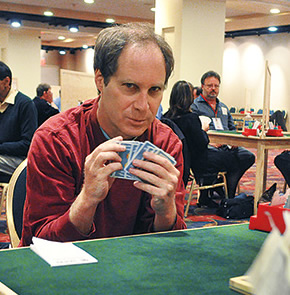This article was first published in Canadian Masterpoints, a specialized magazine for expert players.
A great many club and tournament players these days write “Two Over One Game Force” in the General Approach area of their convention cards. The main advantage of playing 2/1 is that the early establishment of a game force allows for extra bidding space to explore for slam or choose the right game contract. There are two main weaknesses inherent to the 2/1 system:
- You cannot play in 1NT if your partner opens the bidding with one of a major. The 1NT response is forcing.
- Responder often has a rebid problem after his forcing 1NT when opener rebids 2 of a minor (possibly a 3 card suit) due to the wide high card ranges and many possible distributions of both hands.
If you are going to play 2/1 you better get used to these problems since there isn’t much you can do about them. The way that most partnerships play 2/1 creates many other problems that are not inherent to the system. The purpose of this article is to discuss some of the problems caused by the way that most people use 2/1 and to suggest some solutions.
PROBLEM 1: The lack of definition of the 2/1
Since a 2/1 response to a major suit opening is a game force, many pairs use a 2/1 simply to establish a force without regard to the fact that they may be misdescribing their hands. They assume that all of the room that they save will allow them to “catch up later”. They are wrong. Imagine, for example, that you hold:
![]() AQxxxx
AQxxxx ![]() x
x ![]() Axx
Axx ![]() Qxx
Qxx
You open 1![]() and your partner bids 2
and your partner bids 2![]() , forcing to game. You rebid 2
, forcing to game. You rebid 2![]() and partner raises to 3
and partner raises to 3![]() . Do you like your hand? You should. Despite your minimum point count you have good trumps, good controls and a good fit for partner’s suit. Unfortunately, partner’s “suit” may not really be a suit. Partner could have:
. Do you like your hand? You should. Despite your minimum point count you have good trumps, good controls and a good fit for partner’s suit. Unfortunately, partner’s “suit” may not really be a suit. Partner could have:
![]() KJx
KJx ![]() AKxx
AKxx ![]() Kx
Kx ![]() Jxxx
Jxxx
where even the five level is not safe. On the other hand, if you reverse partner’s hearts and clubs slam is laydown. If you reverse your hearts and clubs, slam is also laydown. Would you like your hand as much if you had a singleton in your partner’s suit? You shouldn’t, but when a 2/1 can show just about any balanced hand with game forcing values you are asking for trouble like this.
There are several popular solutions to this sort of problem. Most of them involve making some other bid besides a 2/1 when responder has a balanced game force with 3 card support for opener’s major. Some players bid 1NT forcing followed by a jump to four of opener’s major as showing a balanced 13-15 with 3 card support. Some players play that a 3NT response to a major suit opening shows this type of hand. Variations of the Swiss convention use jumps to the four level to show various balanced raises. All of these methods have the problem that they take up too much room and make it impossible to find out how well the hands fit at a safe level.
The solution that I suggest is… [ilink url=”http://www.imp-bridge.nl/articles/2over1.htm”]Click Here[/ilink] to continue Reading
Esta entrada también está disponible en: Spanish

